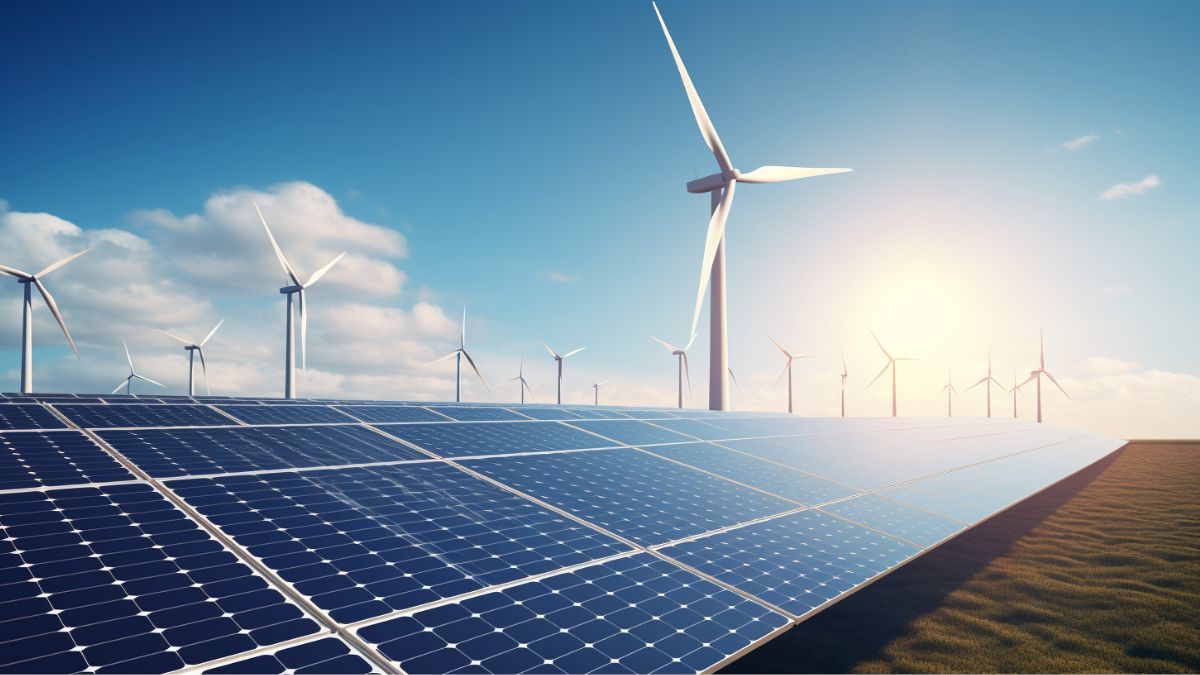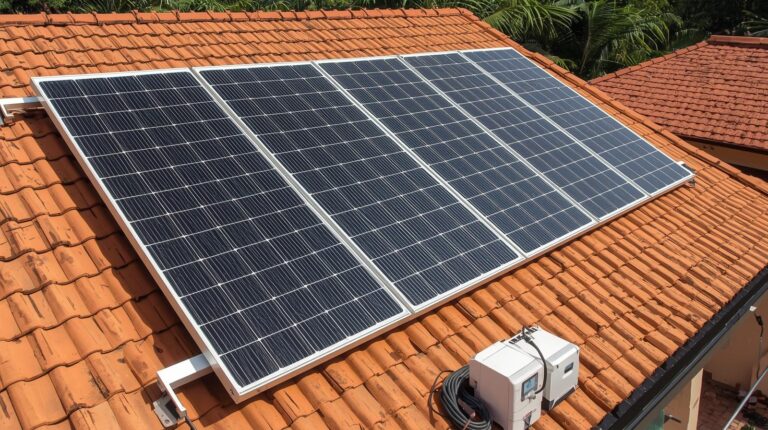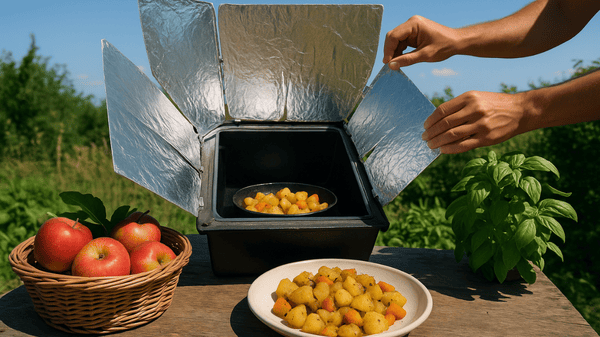Are you torn between choosing solar or wind power as the better renewable energy option for your home? In this unbiased and data-driven article, we will compare and evaluate the advantages and disadvantages of both options to help you make an informed decision. So, let’s delve into the world of solar vs. wind energy and find your perfect fit.
By analyzing the cost-effectiveness, energy production, and suitability for residential properties and utilities, we aim to provide you with the necessary information to determine which option will best suit your energy needs.
Let’s delve into the world of solar vs. wind energy and find your perfect fit.
Key Takeaways
- Solar energy is more cost-effective for residential electricity customers.
- Wind power is commonly used by utilities to source reliable renewable energy.
- Solar panels are more popular than wind turbines for residential energy production.
- Solar is generally the best option for homeowners interested in installing a renewable energy system.
Overview of Solar Vs Wind Energy
When considering renewable energy options, you should compare the benefits and drawbacks of solar vs wind energy.
Solar energy offers several advantages for homeowners. It’s more cost-effective for residential electricity customers and can save homeowners thousands on their electricity bills. Solar panels are also practical and popular for residential energy production, as they are installable on almost any roof or on the ground.
On the other hand, wind power is commonly used for large-scale energy production by utilities. Wind turbines can generate power 24 hours a day and aren’t dependent on sunlight. However, wind turbines require average wind speeds of at least 12 miles per hour.
Both solar and wind energy have their own cost effectiveness, and it’s important to research and compare different options before making a decision.
Comparing Solar and Wind Costs
You can compare the costs of solar vs wind energy to determine which option is more cost-effective for your needs. Here are some key points to consider:
- Financial Savings: Solar energy is generally more cost-effective for residential customers, as solar panels have the potential to save thousands on electricity bills.
- Return on Investment: Solar panels can provide a good return on investment, especially when you consider the potential savings over the lifespan of the system.
- Cost Comparison: It’s important to research and compare the costs of both solar and wind energy systems. Factors such as installation, maintenance, and the availability of incentives can all impact the overall cost.
Advantages of Solar for Residential Properties
Solar panels provide significant cost savings for residential properties, as they can generate clean electricity from sunlight and reduce dependence on traditional energy sources. When considering the advantages of solar financing, the solar panel installation process, and solar incentives and rebates, homeowners have a compelling case for choosing solar as their renewable energy option.
| Advantages of Solar Financing | Solar Panel Installation Process | Solar Incentives and Rebates |
|---|---|---|
| Lower upfront costs | Simple and efficient | Federal tax credits |
| Monthly payment options | Quick and hassle-free | State and local incentives |
| Increased property value | Professional installation | Net metering |
Advantages of Wind Power for Utilities
If you’re looking to diversify your energy sources, consider incorporating wind power into your utilities as it can provide a reliable and sustainable option. Wind power offers numerous advantages, including:
- Renewable and clean energy source: Wind turbines harness the power of the wind, which is a naturally occurring resource, making it a sustainable and eco-friendly option.
- Reliability: Wind power has proven to be a reliable source of electricity, particularly in areas with consistent wind patterns. With advancements in technology, wind turbines are becoming more efficient and able to generate electricity even at lower wind speeds.
- Grid integration: You can easily integrate wind power into the existing electrical grid, allowing for a smoother transition and distribution of energy.
Solar Vs Wind Energy Performance
Although wind power is a popular choice for utilities, solar panels have been proven to produce significantly more electricity in comparative experiments. When considering renewable energy options for residential areas, it is important to evaluate the advantages of solar panels and wind turbines.
A comparative experiment over 14 months showed that solar panels produced five times more electricity than a wind turbine. Additionally, solar panels are installable on almost any roof or on the ground, meeting the majority of electricity needs. On the other hand, wind turbines require average wind speeds of at least 12 miles per hour to perform optimally.
In terms of cost-effectiveness in the long run, solar energy is more cost-effective for residential customers, with the potential to save thousands on electricity bills. Overall, solar panels are the preferred option for residential properties due to their higher electricity production, versatility in installation, and cost-effectiveness.
| Advantages of Solar in Residential Areas | Wind Turbine Performance in Different Wind Speeds |
|---|---|
| Higher electricity production | Optimal performance at wind speeds over 12 mph |
| Versatility in installation | Dependent on wind speeds for optimal performance |
| Cost-effective in the long run | Requires specific wind conditions for efficiency |
Solar Is the Best Option for Residential Properties
You should consider solar as the best option for your residential property due to its practicality, popularity, and ability to meet the majority of your electricity needs.
- Cost Effectiveness: Solar energy is more cost-effective for residential electricity customers compared to other renewable options. Installing solar panels can lead to significant savings on your electricity bills in the long run.
- Installation Process: The installation process for solar panels is relatively straightforward and you can do it on almost any roof or on the ground. Many solar installers offer hassle-free installation services, making it a convenient choice for homeowners.
- Environmental Impact: Solar power has a positive environmental impact as it’s a clean and renewable energy source. By choosing solar, you can reduce your carbon footprint and contribute to a more sustainable future.
Considering the cost effectiveness, ease of installation, and environmental benefits, solar emerges as the best option for residential properties.
Comparing Solar Vs Wind Energy as Top Renewables
This section compares solar vs wind energy as the top renewables, highlighting their differences and benefits.
When it comes to the advantages of wind turbines, they’ve the ability to generate power 24 hours a day, regardless of sunlight. However, wind turbines require average wind speeds of at least 12 miles per hour, limiting their placement options.
On the other hand, solar panels are installable on any roof or on the ground, producing sufficient power to meet most electricity needs. Solar energy is also more cost-effective for residential customers.
In terms of the environmental impact, both wind and solar have minimal emissions and contribute to reducing greenhouse gas emissions. Additionally, the government provides incentives for renewable energy, such as tax credits and grants, to encourage adoption.
Ultimately, the choice between solar vs wind energy depends on factors like location, energy needs, and cost-effectiveness.
Other Renewable Energy Options
If you’re considering renewable energy options, it’s important to explore other alternatives such as solar thermal and geothermal systems, which can complement solar panels for a comprehensive solution.
These options provide additional benefits and can enhance the efficiency and effectiveness of your renewable energy system. Here are three key advantages of solar thermal and geothermal systems:
- Solar thermal benefits: Solar thermal systems harness the sun’s energy to heat water and provide hot water for your home. This can significantly reduce your reliance on traditional heating methods and save you money on energy bills.
- Geothermal heat pumps: Geothermal heat pumps utilize the stable temperature of the earth to regulate the temperature of your home. They can provide both heating and cooling, offering a year-round solution for your comfort needs.
- Comprehensive renewable solutions: By combining solar thermal, geothermal, and solar panels, you can create a comprehensive renewable energy system that maximizes energy efficiency and minimizes environmental impact.
Exploring these alternative options alongside solar panels can help you create a more sustainable and cost-effective renewable energy solution for your home.
Comparing and Evaluating Renewable Energy Options
Once you have thoroughly researched and compared different renewable energy options, you can make an informed decision on which option best suits your needs and preferences.
When evaluating renewable energy options, it’s important to consider cost effectiveness, environmental impact, and government incentives and policies. Conducting a cost effectiveness analysis is crucial in determining the financial viability of each option.
Additionally, comparing the environmental impact of different renewable energy sources allows you to choose the option that aligns with your sustainability goals.
Lastly, understanding government incentives and policies can provide valuable information on potential financial support or regulations that may affect your decision.
Saving Money on Renewable Energy Systems
You can save up to 25% on the costs of installing a renewable energy system by shopping around and comparing quotes from different providers. This cost savings can have a significant impact on your return on investment.
Here are three key factors to consider when looking for the best deal on a renewable energy system:
- Cost savings: By comparing quotes, you can ensure that you’re getting the best price for your renewable energy system. This can result in substantial cost savings, making the investment more affordable and providing a quicker return on investment.
- Return on investment: Investing in a renewable energy system can provide long-term financial benefits. By reducing your reliance on traditional energy sources, you can save money on your energy bills and potentially even generate income through incentives like net metering.
- Energy efficiency: Renewable energy systems, such as solar panels or wind turbines, are known for their energy efficiency. By harnessing the power of the sun or wind, these systems can generate clean, sustainable energy that’s both cost-effective and environmentally friendly.
Frequently Asked Questions
What Are the Environmental Benefits of Solar and Wind Energy?
Solar and wind energy have significant environmental benefits. They both contribute to sustainability by reducing carbon footprints. Solar energy harnesses the power of the sun, while wind energy utilizes the natural force of the wind.
Are There Any Government Incentives or Tax Credits Available for Installing Solar or Wind Systems?
Yes, there are government incentives and tax credits available for installing solar or wind systems. You can take advantage of these programs to make your transition to renewable energy more affordable.
How Long Do Solar Panels and Wind Turbines Typically Last Before They Need Replacement?
Solar panels and wind turbines typically last for several decades before needing replacement. With regular maintenance, advancements in technology, and improvements in durability, both options offer long-term viability for renewable energy solutions.
Can We Use Solar Panels or Wind Turbines in Conjunction With Traditional Energy Sources?
Yes, you can use solar panels and wind turbines in conjunction with traditional energy sources. Hybrid energy systems allow for renewable integration and energy diversification, providing a sustainable and reliable power solution.
What Are the Challenges or Limitations of Using Solar or Wind Energy in Certain Geographical Areas?
Geographical challenges and renewable limitations can impact the effectiveness of solar and wind energy options. It’s crucial to consider factors like average wind speeds and sunlight availability to determine the most suitable renewable energy solution for a specific location.
Conclusion
After comparing the advantages and disadvantages of solar and wind power, it’s clear that both options have their strengths. Both solar and wind power have their merits and can play a significant role in our transition towards a sustainable and clean energy future.
Solar energy offers a cost-effective and efficient solution for residential properties, harnessing the abundant and renewable energy from the sun. On the other hand, wind power provides a reliable and constant source of energy, with the ability to generate electricity even in low wind conditions.
Ultimately, the choice between solar vs wind energy depends on various factors such as location, available space, and energy requirements. By considering these factors, individuals and communities can make informed decisions that contribute to a greener and more sustainable world.




